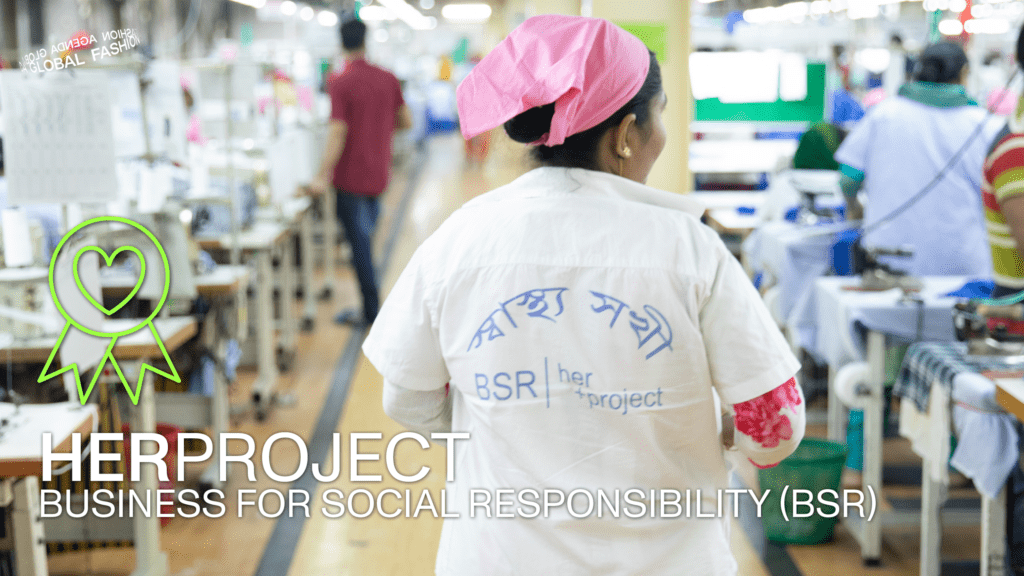BSR ON RESPECTFUL AND SECURE WORK ENVIRONMENTS


The fashion value chain employs around 65 million people, the majority being female, many of whom are exposed to occupational hazards, ranging from exposure to dangerous work conditions to discrimination.1 Today, gender-based violence remains a leading issue on the global development agenda with 1 in 3 women worldwide experiencing physical and or sexual violence from men at some point in their lives. However, change is coming. Following the adoption of the 190 ILO Convention on Violence and Harassment in the world of work in June 2019, companies are increasingly expected to prevent and address gender-based violence.2 To achieve this, the industry must move beyond the silence surrounding gender-based violence in order to engage the right stakeholders to address this both globally and locally.
On a mission to create a just and sustainable world, BSRTM (Business for Social Responsibility) is an organisation of sustainable business experts working with its global network of the world’s leading companies to provide insights, advice, and collaborative initiatives that create long-term business value, and scale impact.
One of BSR’s most well-known collaborative initiatives HERprojectTM strives to empower low-income women working in global supply chains. By bringing together global brands, their suppliers, and local NGOs, HERprojectTM drives impact for women and businesses via workplace-based interventions on health, financial inclusion and gender equality. Since its inception in 2007, HERproject™ has worked in more than 850 workplaces across 14 countries and has increased the wellbeing, confidence and economic potential of more than 1,000,000 women and 620,000 men.
Today, the prevalence of violence for women in Asia including its garment industry is unwarrantable with 60% of garment workers in India and Bangladesh having reportedly experienced sexual harassment in the workplace. As part of BSR’s wider collaborative initiative HERprojectTM, the HERrespect programme aims to cultivate gender equitable attitudes and relationships among women and men, contributing to stronger workplace relationships, prevention of gender-based violence, and strengthening the ability of workplaces to respond to incidents of gender-based violence. From the programme’s induction in 2018 to Fall 2020, 19 factories have completed the 18-month programme reaching 9,010 women, 3,517 male workers, 100 managers and the successful roll out of training for 188 peer educators.
A garment factory based in Bangalore, India, which supplies to a global specialty retailer was one of the factories who completed the HERrespect programme. 1,400 workers including women, men, and supervisors were reached either through direct training or through a peer-to-peer educator methodology. The project, co-delivered with Swasti – a local expert organisation focused on health and well-being – included a 6-module on-site training for workers and supervisors, covering topics on soft skills, communication styles, gender norms, violence and relationships, and support networks. HERrespect also supported and guided the factory to strengthen their systems to reduce the risk of women facing gender-based violence at the workplace, and to build organisational systems that respond timely and fairly when workers raise complaints about these behaviors. Results taking from the end-line programme survey showed a significant reduction in workers’ acceptance of violence against women and gender-unequal statements, with both male and female workers reporting that ‘supervisors punishing employees is a normal and acceptable occurrence’ dropping from 50% to 6%, plus the belief that ‘women deserve to be beaten sometimes’ falling from 32% to 4%.
To find out how you can join BSR’s HERproject in addressing harassment and violence in the workplace visit HERprojectTM here.
Legislation is coming. Already, in the case of Asia, countries such as India and Bangladesh require companies to prevent and address sexual harassment through national legislation. The industry can no longer afford to delay action.
As a first move, brands, manufacturers, employee representatives, local governments and associations must work collaboratively to raise standards and track the progress of human and labour rights to allow voices of workers to be heard and to raise industry compliance standards around due diligence and human rights.3 To learn more about how you can act to ensure safe working conditions for garment workers free of violence and discrimination read our Fashion CEO Agenda – Respectful and Secure Work Environments.
REFERENCES
1 Global Fashion Agenda. (2021). Fashion CEO Agenda 2021.
2 Business for Social Responsibility. (2021). HERrespect.
3 Global Fashion Agenda. (2021). Fashion CEO Agenda 2021.